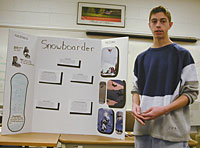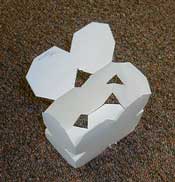
The Profile Philosophy
by Jim Bickal
February 7, 2000
|
After years of debate and phasing in, the Minnesota graduation standards are now having a real impact on students. This year's high school seniors are the first students who will be required to pass basic skills tests in reading and math in order to graduate. The other half of the standards, the so-called high standards or Profile of Learning, may be having an even greater impact on students. This year's sophomores must complete 24 standards before they graduate. IN MOST CASES, the requirements of the Profile of Learning have been added to existing courses, but administrators at North High School found no logical course in which to place the "career investigation" standard, so they created a new course and Stan Rosen volunteered to teach it.
Rosen: We've been investigating 16 different careers that we might be interested in, each of us. We're going to narrow it down to four next week and you're going to be required to have four resources - whether they're interviews, whether they're software that are from Minnesota careers, books - four resources.All tenth-graders at North are required to take "Career Investigation." They learn about different careers, evaluate their interests and aptitudes, compile a portfolio of their accomplishments and make a final presentation about a career they may be interested in pursuing. Some take the assignment more seriously than others. Student: The career I chose is professional snow-boarder. The main requirement is just being very good at snow-boarding. You can't be, like, a loser that's not, who, like, gets in trouble with the law.Rosen says the goal of the career investigation class is to get students thinking about, and planning for what they'll do after high school. Rosen: I think they're going to realize that education doesn't end at grade 12, regardless of whether you go into the service or go into college or into the workforce; that you're going to be responsible for educating yourself and that never ends. You're going to have a variety of careers in your life and the goal is, basically, hopefully, we get them off the bench and into the starting lineup in life, not to make a final career decision, but to be exposed to what's out there and know the pros and cons and how they can benefit from these opportunities.This idea that students need to learn how to educate themselves is one of the fundamental concepts behind the Profile of Learning. Karen Klein taught English in the North St. Paul district for 32 years. She's now a "teacher on special assignment," helping other teachers implement the standards. Klein: I think the basis of graduation standards is to get the kids to learn broad skills and concepts so that they can apply those skills and concepts to whatever content there might be. It's not that content isn't important, because you can't learn concepts and skills without content. But saying that every child has got to know every battle from the beginning of time up to the 20th century or 21st century is no longer reasonable when we think of knowledge doubling, tripling, quadrupling in such a short period of time.Critics of the graduation standards say required courses like "career investigation" will replace more traditional electives that don't fit in with one of the standards. Joan Segnar teaches English at North, including a popular elective course in grammar.
Segnar: As I look at the future, I'm really worried because there is no standard for grammar. I was told by the higher-ups that "that's just a bunch of facts. We want process." I think grammar is valuable. I've had kids come to me after they've taken the A.C.T. and tell me, "I am so glad I took the class because I did well on the verbal section." And as I look at the future, I see that the grammar classes will just go down to probably nothing because as kids go, they'll have to take more and more classes that offer the standards, and it will disappear.While it's unclear whether electives like grammar will disappear, courses such as algebra I and II and geometry have already been removed from the North High curriculum. The district has switched to a new way of teaching math. Class: Are you all with me here? You know the defining recursive equations. You already know which data are from an additive process and which are from a multiplicative process, but what are efficient ways to identify such data when you don't know in advance what type they are?Under the new method, known as "integrated math," concepts that used to be covered in separate algebra and geometry classes are woven into a comprehensive three-year program. Students don't just plug numbers into equations, they solve real-world problems like how to design an efficient package for storing tennis balls. Teacher Ellen Delaney says this project demonstrates understanding of a number of different mathematical skills at once. Delaney: They studied areas of things. They had to study percentages. They had to study proportions and they had to do comparisons. So there's some interesting math, but then put on top of that all the geometry to it. They had to know the shapes. They had to know their dimensions, how those dimensions impact the size. How do you compare size when you're in different dimensions?Delaney says the district was moving in the direction of integrated math before the graduation standards were adopted, but once the standards were in place, it made the decision easier because the philosophy of integrated math fits well with the philosophy of the standards. Math teacher Judd Sather says the projects where students apply what they know help the kids who don't do well on tests. Sather: We're doing calculator projects and I had a D- student that just did this amazing project, and everybody was clapping for him and things like that. And it's a kid who actually had a brain surgery-type thing, and I think it was really good and powerful for him to do that, and he's a special education student as well. And he just made this incredible project with the year 2000 and confetti and stuff like that on a calculator. He made it himself.
Ludke I think the math is harder than what it used to be. I liked the old math a lot more. I don't like all the words. I would rather just have a problem put out, you know, on the paper instead of all these words to tell me what to do.Many parents also have problems with the integrated math. Paul Darden talked about his concerns during recent parent-teacher conferences. Darden: We struggled a lot with integrated math. My daughter is very much a cut-and-dried, black-and-white kind of a person. And now with this generic, well we have to find the problem in the middle of the world, while yes that is a real-world situation, it's a very difficult thing for her to understand because she's not in those real world situations so it's just as obtuse as it would be to set a formula down for her.During a recent class, teacher Ellen Delaney tried to convince a group of students that they'll eventually understand how to do integrated math even if their parents or siblings can't help them with their homework. In many ways the debate over the merits of integrated math is a microcosm of the whole graduation standards debate. The opponents say the old way was working just fine and the new system makes things worse. The proponents say, while it may take some getting used to in the short term, in the long run students will learn more and be better prepared under the new system. |
|||||||||||||||||||||||||||



